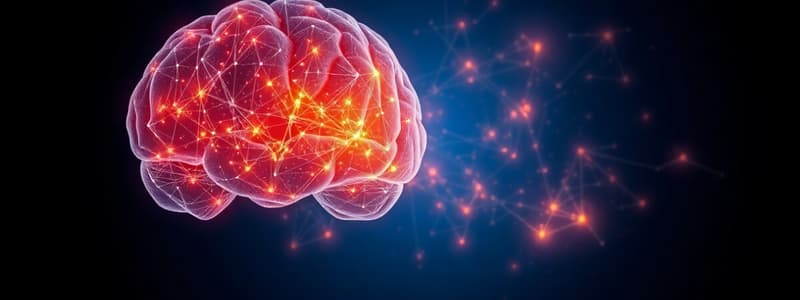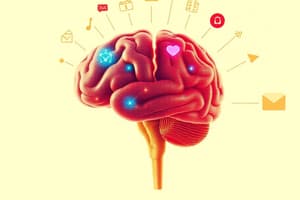Podcast
Questions and Answers
Which memory model is primarily concerned with the active manipulation of information for cognitive tasks?
Which memory model is primarily concerned with the active manipulation of information for cognitive tasks?
- Long-term memory
- Working memory (correct)
- Short-term memory
- Sensory memory
What does Vygotsky's Sociocultural Theory emphasize in cognitive development?
What does Vygotsky's Sociocultural Theory emphasize in cognitive development?
- Social interaction and culture (correct)
- Moral development
- Individual exploration and discovery
- Biological maturation
Which type of therapy focuses on challenging and changing unhelpful cognitive distortions?
Which type of therapy focuses on challenging and changing unhelpful cognitive distortions?
- Psychoanalytic therapy
- Gestalt therapy
- Humanistic therapy
- Cognitive-behavioral therapy (correct)
What is one of the central concepts studied in Social Psychology regarding how individuals are influenced by others?
What is one of the central concepts studied in Social Psychology regarding how individuals are influenced by others?
Erikson's theory of psychosocial development includes how many stages?
Erikson's theory of psychosocial development includes how many stages?
What type of abnormal behavior is characterized by excessive fear or anxiety?
What type of abnormal behavior is characterized by excessive fear or anxiety?
Which neurotransmitter is commonly associated with mood regulation?
Which neurotransmitter is commonly associated with mood regulation?
In neuropsychology, which brain structure is primarily associated with decision-making processes?
In neuropsychology, which brain structure is primarily associated with decision-making processes?
Flashcards are hidden until you start studying
Study Notes
Cognitive Psychology
- Definition: Study of mental processes, including perception, memory, thinking, and problem-solving.
- Key Concepts:
- Information Processing: How the mind processes information akin to a computer.
- Memory Models: Short-term vs. long-term memory; working memory.
- Cognitive Biases: Systematic patterns of deviation from norm or rationality in judgment.
- Applications: Improving educational methods, enhancing memory and learning strategies, cognitive therapy.
Developmental Psychology
- Definition: Study of psychological growth and changes throughout the lifespan.
- Key Theories:
- Erikson's Psychosocial Development: Eight stages from infancy to adulthood, emphasizing social relationships.
- Piaget's Cognitive Development: Stages of cognitive development (sensorimotor, preoperational, concrete operational, formal operational).
- Vygotsky's Sociocultural Theory: Emphasizes the role of social interaction and culture in cognitive development.
- Focus Areas: Child development, attachment theories, influence of family and culture.
Abnormal Psychology
- Definition: Study of abnormal behavior, psychopathology, and mental disorders.
- Key Concepts:
- Diagnostic Criteria: DSM-5 (Diagnostic and Statistical Manual of Mental Disorders) for classification.
- Approaches to Treatment: Psychotherapy (cognitive-behavioral, psychodynamic) and pharmacotherapy.
- Major Disorders: Anxiety disorders, mood disorders, personality disorders, schizophrenia.
- Etiology: Biological, psychological, and social factors influencing mental health.
Social Psychology
- Definition: Study of how individuals think, feel, and behave in social contexts.
- Key Concepts:
- Social Influence: Conformity, obedience, and group dynamics.
- Attitudes: Formation, change, and the impact on behavior.
- Prejudice and Discrimination: Causes and consequences of biased attitudes toward groups.
- Research Methods: Observation, surveys, experiments to assess social behavior.
Neuropsychology
- Definition: Study of the relationship between brain function and behavior.
- Key Concepts:
- Brain Structures: Understanding regions associated with specific functions (e.g., frontal lobe for decision-making).
- Neurotransmitters: Chemical messengers influencing mood and behavior (e.g., serotonin, dopamine).
- Brain Injury and Disorders: Effects of traumatic brain injury, stroke, and neurodegenerative diseases on cognition and behavior.
- Assessment Tools: Neuroimaging (fMRI, PET scans), neuropsychological testing to evaluate cognitive functions.
Cognitive Psychology
- How the mind processes information is a core concept, akin to how a computer works.
- Memory is categorized into short-term, long-term, and working memory.
- Cognitive biases are systematic errors in judgment, indicating deviations from rationality.
- Applications extend to improving education, memory strategies, and cognitive therapy.
Developmental Psychology
- This field examines psychological changes throughout the lifespan.
- Erikson's theory proposes eight stages, emphasizing social relationships from infancy to adulthood.
- Piaget's stages of cognitive development include sensorimotor, preoperational, concrete operational, and formal operational.
- Vygotsky's sociocultural theory emphasizes the role of social interaction and culture on cognitive development.
- Focus areas include child development, attachment theories, and the influence of family and culture.
Abnormal Psychology
- This field investigates abnormal behavior, psychopathology, and mental disorders.
- The DSM-5 (Diagnostic and Statistical Manual of Mental Disorders) provides classification criteria for mental disorders.
- Treatment approaches include psychotherapy (e.g., cognitive-behavioral, psychodynamic) and pharmacotherapy.
- Major disorders include anxiety disorders, mood disorders, personality disorders, and schizophrenia.
- Etiology refers to the interaction of biological, psychological, and social factors influencing mental health.
Social Psychology
- This field examines how individuals think, feel, and behave within social contexts.
- Social influence is a central concept, exploring conformity, obedience, and group dynamics.
- Attitudes are formed, changed, and impact behavior.
- Prejudice and discrimination involve biased attitudes toward groups.
- Research methods include observation, surveys, and experiments to assess social behavior.
Neuropsychology
- This field investigates the relationship between brain function and behavior.
- Brain structures are associated with specific functions, e.g., the frontal lobe for decision-making.
- Neurotransmitters, such as serotonin and dopamine, influence mood and behavior as chemical messengers.
- Brain injury and disorders, like traumatic brain injury, stroke, and neurodegenerative diseases, impact cognition and behavior.
- Neuroimaging techniques (fMRI, PET scans) and neuropsychological testing evaluate cognitive functions.
Studying That Suits You
Use AI to generate personalized quizzes and flashcards to suit your learning preferences.




